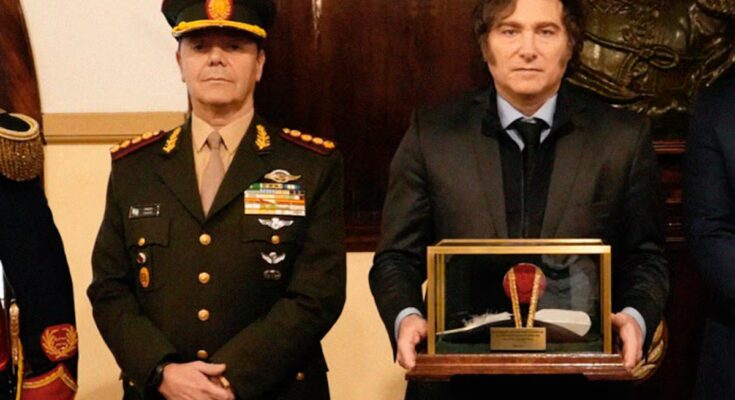A military man will be Argentina’s defense minister for the first time since the end of the dictatorship in 1983. The president, Javier Milei, announced on Saturday that the head of the Army, Lieutenant General Carlos Presti, will replace Luis Petri, who will take up the post of national deputy on December 10. The decision has enormous symbolic weight and the Government made this known in the statement confirming the appointment.
“For the first time since the return of democracy, a person with an impeccable military career, who has reached the highest level of his rank, will head the ministry that will deal with national defense and the Armed Forces, inaugurating a tradition that we hope the political leadership will continue from now on and putting an end to the demonization of our officers, non-commissioned officers and soldiers,” reads the official text.
The last military officer in charge of the Argentine Ministry of Defense was Rear Admiral Norberto Couto. The sailor was fired in December 1981 and the military junta appointed a civilian in his place, the lawyer Amadeo Frúgoli, until then Minister of Justice. Frúgoli lasted less than nine months in office and was replaced by another lawyer, Julio Martínez Vivot, minister until the end of the dictatorship on 10 December 1983. Successive Argentine democratic governments reserved the Ministry of Defense for a civilian, a tradition that no one dared to break, while convictions against military leaders accused of crimes against humanity continued. For Milei, tradition bears witness to a “demonization” of the Armed Forces which he intends to put an end to.
Along with the appointment of the new Minister of Defense, the Casa Rosada announced that the current number two of the Ministry of Security, Alejandra Monteoliva, will replace Patricia Bullrich, senator-elect of La Libertad Avanza. “Monteoliva was a fundamental piece of the Bullrich Doctrine, which establishes as a priority the frontal fight against narco-terrorism and criminal organizations and the maintenance of the rule of law and order on the streets of Argentina,” reads the declaration of his appointment.
The fact that the names of the new ministers were known at the same time demonstrates the effort to provide continuity in the management of two areas that the Government considers essential, so much so as to save them from Milei’s chainsaw. Last year, the Ministry of Defense invested more than $300 million to purchase 16 used F-16 fighter planes from Denmark, an expense unthinkable elsewhere in the Administration.
Milei was forced to change the ministers of Security and Defense because both were elected on 26 October to occupy legislative positions. They were not, however, the only movements in government. Three weeks ago, Milei lost its prime minister, Guillermo Francos, the friendliest face in the government. Francos left his post fed up with internal pressures. The Minister of the Interior also left with him, a man he trusted.



